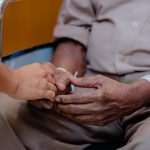Discover What to Expect from Our Home Nursing Services. Learn More

-
CALL: +011 5 777 777

- Home Nursing Care
- December 31, 2024
- 10 MINS READ
Professional nurses play a vital role in effectively managing medications at home. With the rising number of individuals receiving medical care in their own residences, the need for skilled and knowledgeable nurses to oversee medication intake has become increasingly important.
These healthcare professionals bring expertise to ensure that patients are taking the correct medications at the right times and in the proper dosage. They play a critical role in monitoring for potential drug interactions and side effects, and provide education and support to patients and their families regarding medication management.
By helping patients adhere to their prescribed regimen, professional nurses help prevent medication errors, adverse reactions, and hospital readmissions. They also act as a bridge between patients, doctors, and pharmacists, ensuring clear communication and promoting overall safety and well-being.
In conclusion, professional nurses are integral in effective medication management at home. Their knowledge, expertise, and dedication contribute significantly to keeping patients safe and improving health outcomes.
The Role of Professional Nurses in Medication Management
Professional nurses are essential players in the healthcare system, particularly when it comes to medication management at home. Their responsibilities extend beyond mere administration of drugs; they are tasked with ensuring that patients understand their medication regimens, recognize potential side effects, and adhere to prescribed treatments. This multifaceted role requires a blend of clinical expertise, communication skills, and a compassionate approach to patient care.
Nurses are often the first line of defense in identifying issues related to medication management. They assess patients for understanding and compliance, and they address any barriers that may prevent effective drug use. This might include factors such as cognitive decline, physical limitations, or cultural beliefs that could impact how a patient views their treatment plan. By understanding these nuances, nurses can tailor their interventions to meet each patient’s unique needs. Moreover, professional nurses also advocate for their patients, ensuring that they receive the appropriate medications and dosages as prescribed by physicians. They play a significant role in relaying critical information about medication changes and updates back to the healthcare team. This advocacy not only promotes patient safety but also reinforces the importance of a collaborative approach in healthcare, where nurses serve as a pivotal link among patients, doctors, and pharmacists.
Assessing Patient Needs and Creating a Medication Management Plan
One of the fundamental responsibilities of professional nurses is assessing patient needs and creating individualized medication management plans. This process begins with a comprehensive evaluation of the patient’s medical history, current medications, allergies, and overall health status. By gathering this information, nurses can identify potential risks and develop a plan that promotes safe and effective medication use.
During this assessment phase, nurses also consider the patient’s lifestyle, support systems, and preferences. Understanding a patient’s daily routine and challenges allows nurses to design a medication schedule that fits seamlessly into their lives. For instance, if a patient struggles with morning routines, a nurse might recommend adjusting the timing of certain medications to alleviate stress and improve adherence.
Once the assessment is complete, nurses collaborate with the patient and their family to create a medication management plan that is realistic and achievable. This plan typically includes detailed information on each medication, including indications, dosages, timing, and potential side effects. By involving patients and their families in this process, nurses empower them to take an active role in their health, thereby increasing the likelihood of adherence and positive health outcomes.
Educating Patients and Their Families About Medication Management
Education is a cornerstone of effective medication management, and professional nurses excel in this domain. They provide essential information to patients and their families about the medications being prescribed, including their purpose, how to take them correctly, and what to watch for in terms of side effects. This education is crucial, as it equips patients with the knowledge they need to manage their medications confidently.
Nurses often employ various teaching strategies to ensure that information is understood. This may involve using visual aids, teach-back methods, and personalized demonstrations to clarify complex concepts. By tailoring their educational approaches to the individual learning styles of patients, nurses enhance understanding and retention. This personalized education fosters a sense of partnership between nurses and patients, promoting a supportive environment for medication management.
Furthermore, nurses address any misconceptions or fears that patients or their families may have regarding medications. By providing clear explanations and addressing concerns head-on, nurses can help alleviate anxiety and build trust. This open dialogue encourages patients to voice any questions or worries they may have about their treatment, which is vital for ensuring adherence and safety.
Administering Medication and Monitoring Its Effectiveness
The administration of medication is a primary duty of professional nurses, and it requires a high level of attention to detail. Nurses must ensure that the right medication is given to the right patient, at the right time, and in the correct dosage. This meticulous process is critical in preventing medication errors, which can have serious consequences for patient health.
Once medications are administered, nurses play a crucial role in monitoring their effectiveness and the patient’s response. This involves observing for therapeutic effects as well as potential adverse reactions. Nurses use their clinical judgment to assess whether a medication is achieving its intended outcomes or if adjustments are needed. This ongoing evaluation is essential in ensuring that patients receive optimal care.
Additionally, professional nurses document their observations and communicate any concerns to the healthcare team. This documentation serves as a vital component of patient care, allowing for continuity and coordination among all providers involved. By promptly reporting any adverse effects or concerns, nurses help to facilitate timely interventions, ensuring that patients remain safe and healthy throughout their treatment.
Collaborating with Healthcare Professionals and Pharmacists
Collaboration is key to effective medication management, and professional nurses are at the forefront of this teamwork. They work closely with physicians, pharmacists, and other healthcare providers to ensure that patients receive comprehensive care. This collaboration is particularly important when managing complex medication regimens, where multiple providers may be involved.
Nurses serve as liaisons between patients and the healthcare team, relaying critical information about the patient’s condition, medication responses, and any issues that may arise. This communication helps to ensure that everyone involved in a patient’s care is on the same page, minimizing the risk of miscommunication and errors. By fostering a collaborative environment, nurses contribute to a holistic approach to patient care that prioritizes safety and well-being.
In addition to communication, nurses also play a significant role in medication reconciliation. This process involves reviewing all medications a patient is taking to identify potential conflicts, duplications, or omissions. By conducting thorough reconciliations, nurses help to prevent medication errors and ensure that patients receive the most appropriate treatments. Their expertise in this area is invaluable in promoting safe and effective medication management.
Identifying and Preventing Medication Errors
Medication errors can have dire consequences, making the role of professional nurses in identifying and preventing these errors critical. Nurses are trained to spot potential issues, such as incorrect dosages, drug interactions, or allergies, before they escalate into serious problems. Their keen observational skills and thorough understanding of pharmacology enable them to act swiftly to mitigate risks.
One of the strategies nurses use to prevent medication errors is the implementation of double-check systems. This may involve cross-referencing the medication order with the patient’s chart and confirming the correct dosage and administration route. Such protocols are designed to catch errors before they occur, enhancing patient safety and promoting a culture of accountability within healthcare settings.
Moreover, nurses are instrumental in fostering an environment where open communication is encouraged. They advocate for patients to report any concerns or discrepancies they notice regarding their medications. By empowering patients to be vigilant partners in their care, nurses help to create a safety net that can catch potential errors before they impact health outcomes.
Providing Emotional Support and Addressing Patient Concerns
In addition to their clinical responsibilities, professional nurses are also a source of emotional support for patients and their families. Managing medications can be overwhelming, particularly for those with chronic health conditions or multiple prescriptions. Nurses provide reassurance and empathy, helping patients navigate the complexities of their treatment plans.
Through active listening and compassionate communication, nurses create a safe space for patients to express their concerns and fears about their medications. This emotional support is crucial, as anxiety about potential side effects or the effectiveness of treatment can hinder adherence. By addressing these concerns, nurses empower patients to engage more fully in their care.
Furthermore, professional nurses often serve as educators about coping strategies and resources available for emotional support. They may refer patients and families to counseling services, support groups, or educational programs that can aid in understanding and managing their conditions. By addressing the emotional aspects of medication management, nurses contribute to a more holistic approach to patient care that considers both physical and mental well-being.
The Impact of Professional Nurses on Medication Adherence and Patient Outcomes
The impact of professional nurses on medication adherence and patient outcomes cannot be overstated. Studies have consistently shown that when nurses are involved in medication management, patients are more likely to adhere to their prescribed regimens. This adherence is crucial in preventing complications, hospitalizations, and worsening health conditions.
Nurses contribute to improved patient outcomes by providing personalized care and education. When patients understand their medications and feel supported in their treatment journey, they are more likely to follow through with their regimens. This adherence leads to better management of chronic conditions, reduced healthcare costs, and enhanced overall quality of life.
Moreover, the presence of professional nurses in home medication management fosters a sense of security and confidence among patients and their families. Knowing that a skilled nurse is overseeing their medication regimen can alleviate anxiety and empower patients to take an active role in their health. This partnership between nurses and patients is instrumental in achieving positive health outcomes and promoting a culture of safety and care.
Conclusion
In conclusion, professional nurses play an indispensable role in effective medication management at home. Their expertise and dedication significantly enhance patient safety, adherence, and overall health outcomes. By assessing patient needs, educating families, administering medications, and fostering collaboration among healthcare professionals, nurses ensure that patients receive comprehensive and individualized care.
The ongoing support and emotional care provided by nurses are equally important, as they address patients’ concerns and empower them to take charge of their health. As the healthcare landscape continues to evolve, the role of professional nurses in medication management will remain vital, bridging gaps in care and promoting safety.
Ultimately, the integration of professional nurses into home medication management not only enhances patient experiences but also contributes to a healthier society. Their commitment to excellence in patient care underscores the importance of their role in the healthcare continuum, making them invaluable assets in the quest for improved health outcomes for all.


